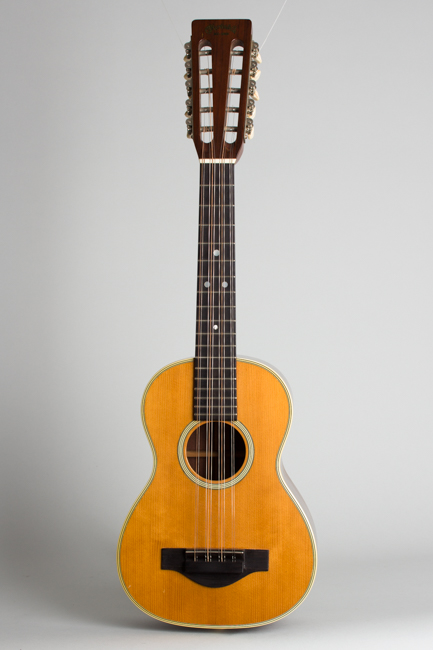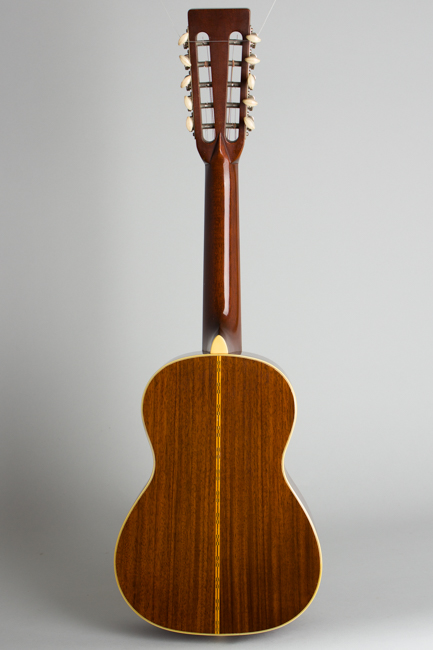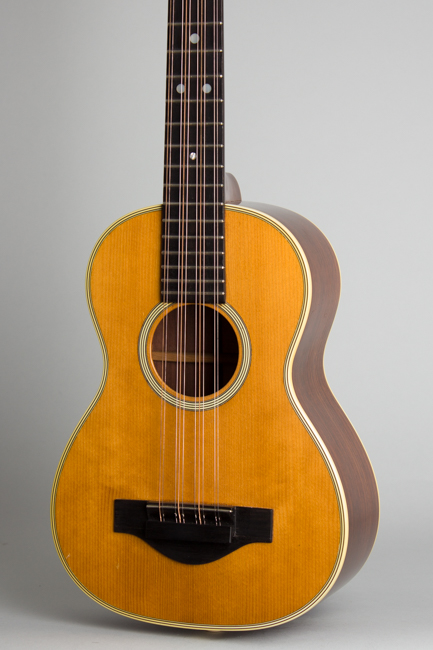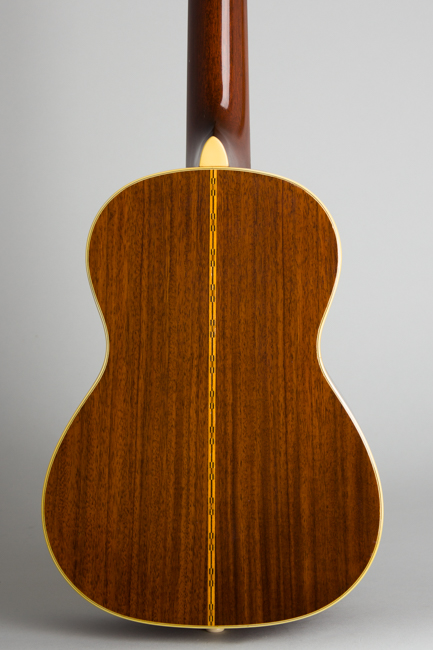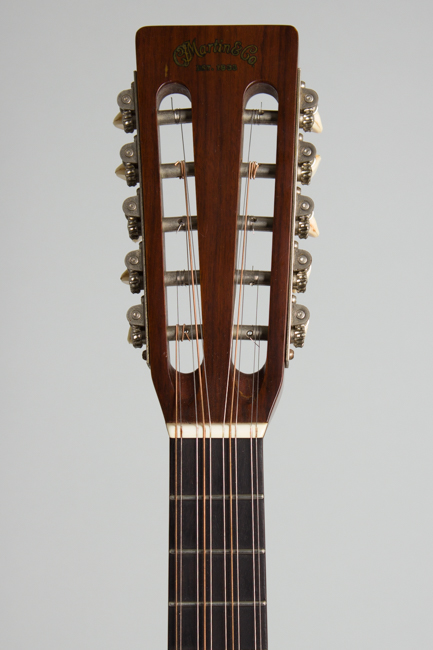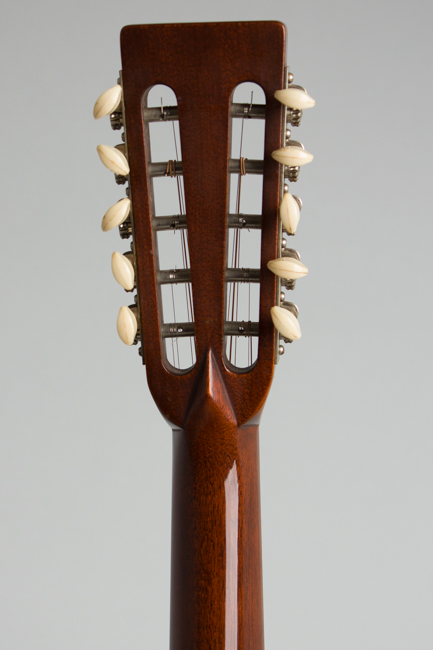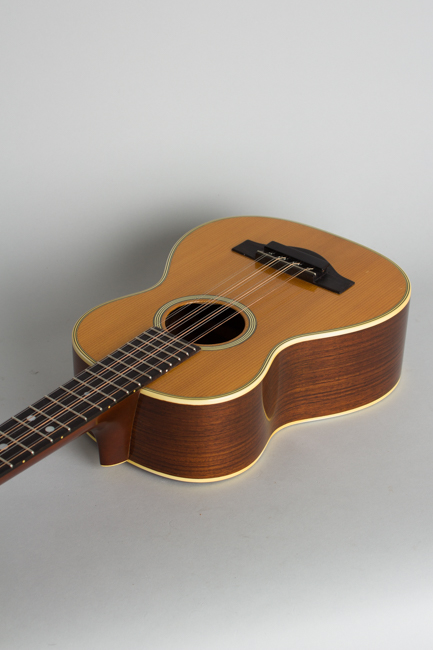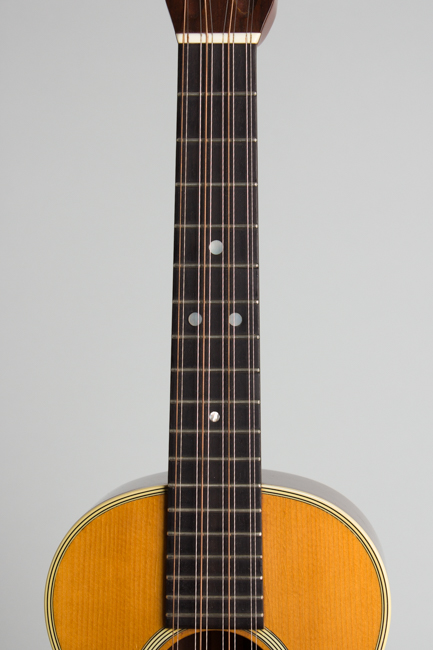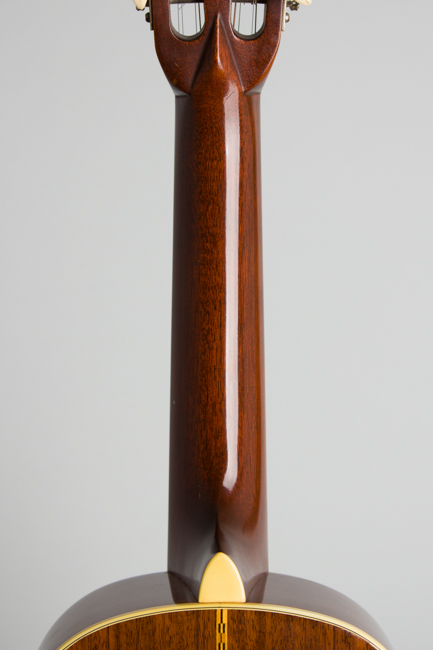C. F. Martin T-28 Tiple (1972)
This item has been sold.
Item # 9760
Prices subject to change without notice.
C. F. Martin T-28 Model Tiple (1972), made in Nazareth, PA, serial # 309855, natural top, dark stained back and sides finish, Indian rosewood back, sides and neck, spruce top; mahogany neck with ebony fingerboard, black gig bag case.
This is a beautiful and great playing example of a rather rare instrument -- a Style T-28 Martin Tiple. Martin's manufacture of "The Uke that went to College!" dates to the early 1920s, but amazingly enough Martin continued to offer them for nearly 70 years. Tiples were still a regular production item in 1972, albeit in miniscule numbers. The T-28 is the most deluxe model of the Martin 10-string family, with rosewood back and sides, spruce top and ebony fingerboard and bridge, built like a miniature Style 28 guitar. It was quite expensive at a $220 list price in 1972 so it's not surprising that only 12 were sold that year!
Martin Tiples were built around obsolete 19th century 1/4 size guitar patterns to create a steel-strung, ukulele-tuned instrument with a bigger, brighter sound. The two middle string courses are triple, with the outside sets doubled and all but the first pair in octaves. With its fairly short neck, large headstock, 10 steel strings and a diminutive guitarlike body this T-28 looks rather like a ukulele crossbred with a 12-string guitar. That's basically what it sounds like, as well, with a lovely round chime when picked daintily and a more raucous shimmer when strummed enthusiastically.
The back and sides on this T-28 are lovely even grained Indian rosewood and the X-braced top nicely grained spruce. The mahogany neck has an ebony fingerboard inlaid with large varied-size pearl dots. The top is 5-ply bound in celluloid, the back 3-ply, and there is a chain backstrip and multi-ply celluloid sound hole ring to add to the fancy factor.
While the Tiple remains obscure in rock-oriented traditions, it has seen some skilled -- and even historically important -- players. Even if not well-remembered today, numerous small African-American string-swing ensembles of the 1930s made extensive use of these small, loud instruments for both fast lead work and frantic rhythm strumming. Two of the best known were the Spirits Of Rhythm (featuring guitarist Teddy Bunn) and Cats and the Fiddle, where Tiny Grimes got his professional start.
The T-28's greatest endorser was Timmie Rogers, a pioneering black comedian singer, dancer sometimes called the "Jackie Robinson of comedy". Rogers' upbeat but still sometimes surprisingly biting comedy is sadly obscure now, but he was well-known in his day and one of the first African-American comedians to receive wide exposure on TV. He was a multi-talented artist-singer, dancer, bandleader, and composer with a Martin T-28 as his steady companion for much of his career, a big part of his act.
No better examples of these now somewhat obscure instruments have ever been made; the T-28 can be called the unchallenged finest-grade Tiple of all time! Like all Martin Tiples it remains -- even if by default -- the world's standard. This is a very nice example of that flagship model, a neat piece in every way.
Overall length is 27 in. (68.6 cm.), 9 in. (22.9 cm.) wide at lower bout, and 3 1/2 in. (8.9 cm.) in depth at side, taken at the end block. Scale length is 17 in. (432 mm.). Width of nut is 1 1/2 in. (38 mm.).
This T-28 remains in excellent original condition, a superb instrument in every way. The only visible repair is the bridge was reglued some time back, pretty much de rigeur on tiples. There is hardly any playing wear at all, just some very light checking and faint pick marks on the top and a couple of deeper dinks into the finish on the upper quarter above and behind the bridge.
Structurally the instrument is truly superb with a nice, flat top, solid bridge, and no cracks anywhere. The neck angle is excellent, the top dead straight (fairly unusual on a Tiple!), and playability is quite good. This is not only a rarity but about the best-playing Tiple we have had, with a low action and smooth, even response. The sound is deeper and sweeter than the typical mahogany Tiples but not quite as loud, or at least a bit less bright. This is one of the neatest small instruments to brighten our doorstep in a long time. Excellent + Condition.
This is a beautiful and great playing example of a rather rare instrument -- a Style T-28 Martin Tiple. Martin's manufacture of "The Uke that went to College!" dates to the early 1920s, but amazingly enough Martin continued to offer them for nearly 70 years. Tiples were still a regular production item in 1972, albeit in miniscule numbers. The T-28 is the most deluxe model of the Martin 10-string family, with rosewood back and sides, spruce top and ebony fingerboard and bridge, built like a miniature Style 28 guitar. It was quite expensive at a $220 list price in 1972 so it's not surprising that only 12 were sold that year!
Martin Tiples were built around obsolete 19th century 1/4 size guitar patterns to create a steel-strung, ukulele-tuned instrument with a bigger, brighter sound. The two middle string courses are triple, with the outside sets doubled and all but the first pair in octaves. With its fairly short neck, large headstock, 10 steel strings and a diminutive guitarlike body this T-28 looks rather like a ukulele crossbred with a 12-string guitar. That's basically what it sounds like, as well, with a lovely round chime when picked daintily and a more raucous shimmer when strummed enthusiastically.
The back and sides on this T-28 are lovely even grained Indian rosewood and the X-braced top nicely grained spruce. The mahogany neck has an ebony fingerboard inlaid with large varied-size pearl dots. The top is 5-ply bound in celluloid, the back 3-ply, and there is a chain backstrip and multi-ply celluloid sound hole ring to add to the fancy factor.
While the Tiple remains obscure in rock-oriented traditions, it has seen some skilled -- and even historically important -- players. Even if not well-remembered today, numerous small African-American string-swing ensembles of the 1930s made extensive use of these small, loud instruments for both fast lead work and frantic rhythm strumming. Two of the best known were the Spirits Of Rhythm (featuring guitarist Teddy Bunn) and Cats and the Fiddle, where Tiny Grimes got his professional start.
The T-28's greatest endorser was Timmie Rogers, a pioneering black comedian singer, dancer sometimes called the "Jackie Robinson of comedy". Rogers' upbeat but still sometimes surprisingly biting comedy is sadly obscure now, but he was well-known in his day and one of the first African-American comedians to receive wide exposure on TV. He was a multi-talented artist-singer, dancer, bandleader, and composer with a Martin T-28 as his steady companion for much of his career, a big part of his act.
No better examples of these now somewhat obscure instruments have ever been made; the T-28 can be called the unchallenged finest-grade Tiple of all time! Like all Martin Tiples it remains -- even if by default -- the world's standard. This is a very nice example of that flagship model, a neat piece in every way.
Overall length is 27 in. (68.6 cm.), 9 in. (22.9 cm.) wide at lower bout, and 3 1/2 in. (8.9 cm.) in depth at side, taken at the end block. Scale length is 17 in. (432 mm.). Width of nut is 1 1/2 in. (38 mm.).
This T-28 remains in excellent original condition, a superb instrument in every way. The only visible repair is the bridge was reglued some time back, pretty much de rigeur on tiples. There is hardly any playing wear at all, just some very light checking and faint pick marks on the top and a couple of deeper dinks into the finish on the upper quarter above and behind the bridge.
Structurally the instrument is truly superb with a nice, flat top, solid bridge, and no cracks anywhere. The neck angle is excellent, the top dead straight (fairly unusual on a Tiple!), and playability is quite good. This is not only a rarity but about the best-playing Tiple we have had, with a low action and smooth, even response. The sound is deeper and sweeter than the typical mahogany Tiples but not quite as loud, or at least a bit less bright. This is one of the neatest small instruments to brighten our doorstep in a long time. Excellent + Condition.
